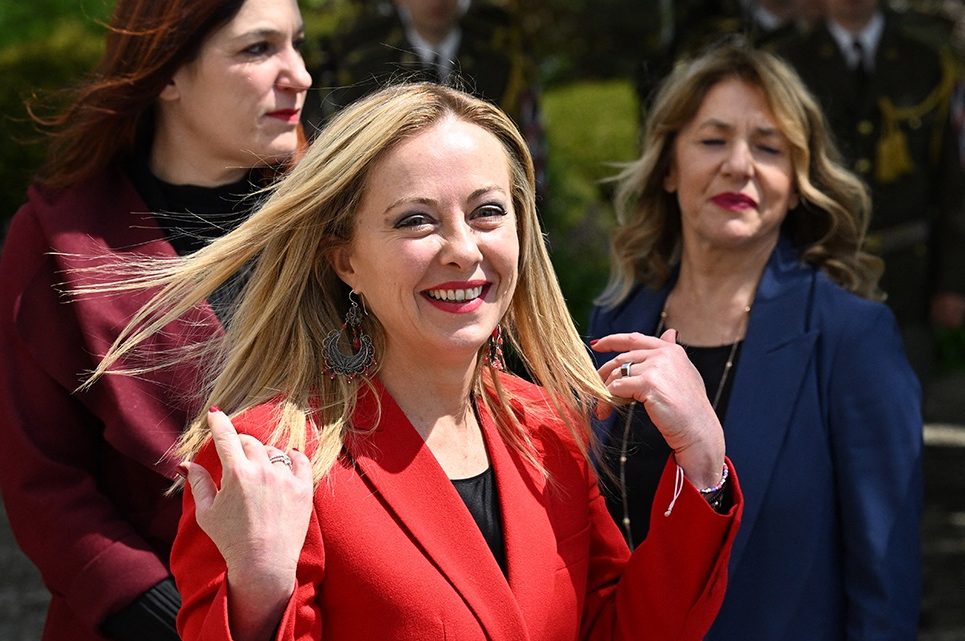Giorgia Meloni, Italy’s first female prime minister, has this week achieved what Britain’s Tories failed so fatally to do with their doomed Rwanda scheme. Thanks to her determination and charm, Italy has become the first European nation to successfully offshore illegal migrants to a non-EU country.
However bogus the claims of migrants, once they’re in the EU it’s virtually impossible to deport them
Under Meloni’s scheme, migrants picked up by Italian naval and coastguard vessels from small boats in the Sicilian Channel will be ferried directly to Albania, 750 miles away. They will not set foot in Italy. It is potentially a game-changer, particularly as voter fury across Europe forces politicians to do something to stop illegal migrants.
The plan is now operative, and on Wednesday the Italian ship Libra docked in the Albanian port of Shengjin to disembark the first migrants destined for what Meloni’s critics compare to Nazi concentration camps. The aim is to fast-track up to 3,000 asylum applicants a month in two purpose-built structures and send most back to their countries of origin.
Her detractors say the cost — $720 million across five years — is an astronomical waste of money. Yet that is peanuts compared to the monthly cost of each migrant to the Italian taxpayer of $1,000 a month. Last year, a near record 158,000 migrants arrived by sea in Italy, which cost $160 million a month.
There were only sixteen migrants on board Libra: ten from Bangladesh and six from Egypt, neither of which is a war zone. But their arrival in Albania may well prove to be highly significant — for one simple reason. However bogus the claims of migrants to be refugees, once they’re in the EU it’s virtually impossible to deport them. So Meloni has been adamant: the only way to stop illegal migrants is to stop them getting to Europe. This scheme — signed off with Albania’s left-wing Prime Minister Edi Rama last November — is a vital part of that strategy, designed not just to deport migrants but, perhaps above all, to act as a deterrent.
Usually when migrants reach Italy, they are more or less free to do as they please while their asylum applications meander through the courts. But if they realize they will be detained — i.e. jailed — in Albania for up to eighteenth months, or deported, how keen will they be to fork out $2,600-odd for a place on a trafficker boat: a sum that is well over the average annual income in a sub-Saharan country?
As Europe continues to shift to the right, Meloni’s strategy gathers ever more momentum. Fifteen EU governments out of twenty-seven have already written a joint letter to the EU Commission urging the introduction of an EU-run equivalent scheme. Even Germany’s chancellor, Olaf Scholz, desperate to counter the collapse in support for his left-wing coalition, has said he is considering a similar plan.
Last month British prime minister Keir Starmer visited Rome to seek advice from Meloni on stopping migrant boats. This prompted Diane Abbott to tweet: "Why is Starmer meeting with Italian PM Giorgia Meloni, a literal fascist, to discuss immigration?" But Meloni is far more in tune with the times than the Labour MP for Hackney North and Stoke Newington.
The recently re-appointed EU Commission President Ursula von der Leyen has praised Meloni’s scheme as "out of the box thinking." Before this week’s EU summit, she wrote to the bloc’s heads of state saying there are "lessons from this experience."
Legally, as opposed to politically, the Tory Rwanda plan failed because Britain’s supreme court ruled Rwanda was a) not a safe country; and b) migrants sent their risked deportation to unsafe countries. It was, to say the least, a bit shortsighted of the Tories to choose a place where, in living memory, up to a million people had been slaughtered. But even a human rights lawyer of the mighty caliber of Sir Keir would find it hard to convince a court that Albania is unsafe. Indeed, in 2022 former prime minister Rishi Sunak struck a deal with Albania to reduce the number of Albanian migrants arriving in small boats.
There are other key differences. With the Rwanda scheme, Rwanda, not Britain, was to have jurisdiction; with the Albania scheme, Italy does. In addition, crucially, only healthy adult men of fighting age from twenty-two countries deemed safe by Italy — and thus demonstrably not refugees — will be sent to the Albanian migrant centers, where the aim is to fast-track asylum applications within a month. Those few granted asylum will then be allowed to go to Italy, while the vast majority will be deported to their countries of origin. It so happens that people from safe countries account for most migrants who arrive in Italy by sea. This year, for instance, the most common country of origin is Bangladesh. Egypt, Tunisia, Pakistan, and Gambia also figure in the top ten. None is at war.
Naturally, human rights groups will go to court relentlessly to argue that not one of those twenty-two "safe" countries is safe. But they will surely struggle to win unless the courts’ default position — which can’t of course be ruled out — is that by definition any Global South (formerly "Third World") country is unsafe. If they do decide this, all that Meloni’s lawyers will be left with is to point out that it is racist and hateful to insist that Global South countries are necessarily unsafe.
Even prior to this scheme, Meloni has already reduced the number of migrant sea arrivals. In September last year, 12,000 arrived in less than one week in Lampedusa. But an EU deal in July 2023 — orchestrated by Meloni with von der Leyen’s backing — has begun to take effect. This was an agreement to pay Tunisia, where most migrants bound for Italy currently set off from, to stop them departing. There were similar deals with other North African countries, notably Egypt, and Italy’s agreement to pay Libya to stop the boats has continued. As a result, migrant arrivals by sea to Italy this year are down 65 percent on last year’s near record.
The project to offshore migrants to Albania should reduce the numbers even more — and Meloni can expect a hefty influx of European leaders arriving in Italy to seek her out and ask for her advice.
This article was originally published in The Spectator’s UK magazine. Subscribe to the World edition here.

























